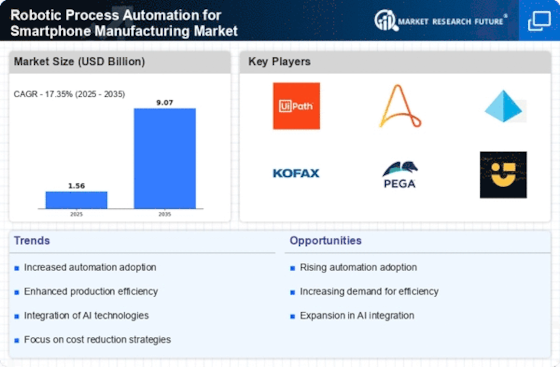Market Share
Robotic Process Automation for Smartphone Manufacturing Market Share Analysis
The rise of IoT (Internet of Things) technology is attracting different industries to use affordable high-performance processors, analytic software, cloud computing, and highly distributed systems in manufacturing and production processes. This is done to increase industrial production frequency and meet the growing global consumer demand. These advancements provide more options to design industrial automation systems that are both cost-effective and offer higher value.
IoT is becoming a trend in various industries such as manufacturing, mining, agriculture, oil & gas, and utilities. This new technology not only makes manufacturing more productive but also smarter. Smart manufacturing allows businesses to predictively meet their needs through intelligent and automated actions, transforming them into proactive and autonomic organizations. Key global players like Bosch, Siemens AG, Emerson Electric Corporation, Rockwell Automation, and ABB Ltd. are leading the way in integrating IoT into their automation solutions. For example, Rockwell Automation launched the Factory Talk View version 9.0 HMI software in February 2017. This software, with the support of the TrendPro tool, allows real-time data access with built-in analysis tools, enhancing manufacturing productivity.
In the coming years, it is expected that more companies will adopt IoT to capture growth by increasing production, creating new business models, leveraging intelligent technologies for innovation, and transforming their workforce. The innovation in mobile interfaces connected with digital technology, including social media and the growing app market, is driving the demand for smartphones globally. Consumers prefer smartphones over traditional mobile phones because of the various features that keep them connected with friends and family anytime, anywhere. This increasing demand for smartphones is pushing mobile platform manufacturers to integrate more features into these devices, making customers' lives easier and more secure. Smartphones can turn cars into smart vehicles connected to the world, taking advantage of useful apps. These apps allow users to control and monitor their driving while providing entertainment for themselves and their fellow passengers.


















Leave a Comment